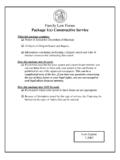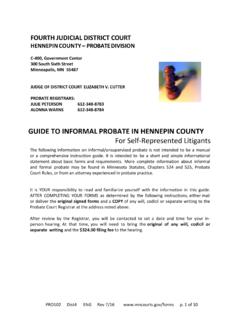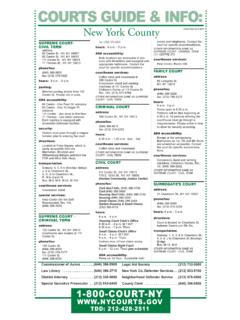Transcription of Additional Questions Frequently Asked by …
1 Additional Questions Frequently Asked by Unrepresented Pro Se Litigants Q. What are the rules that govern appeals in Florida state court? A. The Florida Rules of Appellate Procedure, which can be located in most law libraries and at The Florida Bar's website, See also the Florida Rules of Judicial Administration. Q. Are there any local rules specific to the First District Court of Appeal? A. Litigants in this court should be familiar with the court's Notice to Attorneys and Parties and Electronic Filing Procedure, and may find useful the court's Administrative Orders and Internal Operating Procedures. Q. How do I file a notice of appeal? A. A notice of appeal should be filed in the clerk's office of the lower tribunal or court where the order to be reviewed was entered.
2 See Florida Rule of Appellate Procedure for notice of appeal forms. The notice of appeal is then certified by the lower tribunal to this court. The notice of appeal should contain an original signature and a certificate of service reflecting that a copy has been served on the other side. Original petitions should be filed directly with this court. Q. How much time do I have to file a notice of appeal? A. A notice of appeal must be filed with the lower tribunal or court within 30 days of the order you are appealing. The 30-day deadline begins with the rendition date of the order, not the day it was received by the litigant . Unless the filer is incarcerated, the notice of appeal must be received in the court by the deadline, not simply postmarked or mailed by the deadline.
3 If the filer is incarcerated, the notice of appeal must be submitted to correctional officials for mailing to the court by the deadline (called the mailbox rule, this only applies to pro se inmates who are incarcerated). Failure to timely file a notice of appeal usually will result in the court not having jurisdiction to consider the case. Q. What other deadlines may apply to my case? A. See the Florida Rules of Appellate Procedure for filing requirements and time schedules applicable to your type of case. Q. May I file with the court without an attorney? A. Yes, litigants may represent themselves pro se in a case unless prohibited by law or otherwise ordered by the court (example: corporations are required by law to be represented by an attorney). Pro se litigants are still required to comply with the Florida Rules of Appellate Procedure and orders of this court, and may wish to contact an attorney or refer to the Appellate Practice Section of the Florida Bar's Pro Se Handbook available online in English, Spanish, and Creole at Q.
4 I can't afford an attorney and need legal advice. What do I do? A. Judges of this court are not permitted to provide legal advice, provide separate advisory opinions, or respond to general Questions of the law except in cases properly brought before the court. Employees of the clerk's office and the court's legal staff are likewise not permitted to provide legal advice. Those litigants representing themselves on appeal should review the Florida Rules of Appellate Procedure and may find it helpful to consult the Pro Se (Unrepresented) Appellate Handbook published by the Florida Bar available online at Litigants may also wish to contact the attorney who represented them below, a law clerk at the institution where they are housed, or a legal aid organization.
5 See also the Florida State Court's Self Help page on their website, Q. What is a brief ? A. A brief is a document required to be filed in almost all appeals in which the party sets forth a statement of the case and facts with references to the record on appeal and the party's arguments as to why the decision was in error. The appellant files the initial brief, and then the appellee files an answer brief. After the answer brief, the appellant may file an optional reply brief. Florida Rule of Appellate Procedure sets out the requirements of briefs. For the purposes of clarity, the brief should be clearly marked as Appellant's Initial Brief, Answer brief, etc., and should not be written as a letter. Please note that when submitting a brief, you must provide the original plus three copies.
6 As with any pleading filed in the court, the brief must be properly styled in the court (with First District Court of Appeal at the top), and it must contain an original signature and a certificate of service showing that a copy has been served on the opposing side. You should only write or print on one side of each piece of paper and you are required to only use 8 by 11 inch paper. Q: How do I request action or relief from the court, such as an extension of time to comply with a court order or to file a brief? A. Any request for action or relief you are seeking from this court should be in the form of a motion pursuant to Florida Rule of Appellate Procedure Motions should be styled in the case which reflects "First District Court of Appeal" at the top, the case name, our case number, and the lower tribunal case number.
7 The motion should set forth the specific action you request the court to take and the basis therefor. A motion for extension of time should specify the amount of time requested and when possible, whether opposing counsel/party consents or objects to the extension of time requested. As with any pleading filed in this court, motions must include a certificate of service reflecting that a copy has been served on the opposing parties/counsel. A letter is not the proper format in which to request action of the court. Q: What is a Certificate of Service ? A. A certificate of service is a sentence at the end of a document stating that a copy of that document has been served (mailed, hand delivered, emailed, etc.) on the opposing parties/counsel. Pleadings filed with the court, including motions, briefs, responses, etc.
8 , are not proper to be presented to the court for consideration unless they contain a certificate of service showing that a copy has been served on the other side. If the court directs you in an order to serve a particular person or party, you should serve that person or party and include their name and address in your certificate of service. This court does not provide service of process for litigants. Litigants must serve a copy of all pleadings filed with the court on opposing counsel themselves. Without a certificate of service, a pleading is not proper to be presented to the court for consideration. Example of Certificate of Service: I certify that a copy hereof has been furnished to (opposing counsel names and addresses) by (delivery/mail/email) on (date).
9 _____ (signature). (name). (address). (phone number). Q. What is oral argument and how can I request one? A. Oral argument (or OA) is when the attorneys/litigants in a case appear before a panel of three judges to discuss the issues in the case. A timely request for oral argument must be filed with the court. See Florida Rule of Appellate Procedure Q. How long will it be before my case is decided? A. Cases are presented to the court in the order in which they become ready for review. A case is ready for review by the court when all of the required briefs have been filed, all outstanding orders have been complied with, and necessary motions have been ruled upon. There is no way to determine how long it will be before a decision is reached in a particular case.
10 As soon as a decision is issued, all parties or their attorneys will be mailed a copy of the court's opinion. Q. What is a Per Curiam Affirmed opinion? A. A per curiam affirmed decision means that the judges have reviewed the case and determined that there was no reversible error. Thus, they affirmed the lower tribunal's decision. The court found that it was not necessary to write an explanation other than the decision that there was no reversible error. This is not unusual. It is up to the judges to determine whether there is any precedential value or other reason which would require them to provide the reasons for affirming the decision. Q. As a litigant without an attorney ( a pro se party ), may I register with the court's online portal, eDCA, and file documents electronically?








